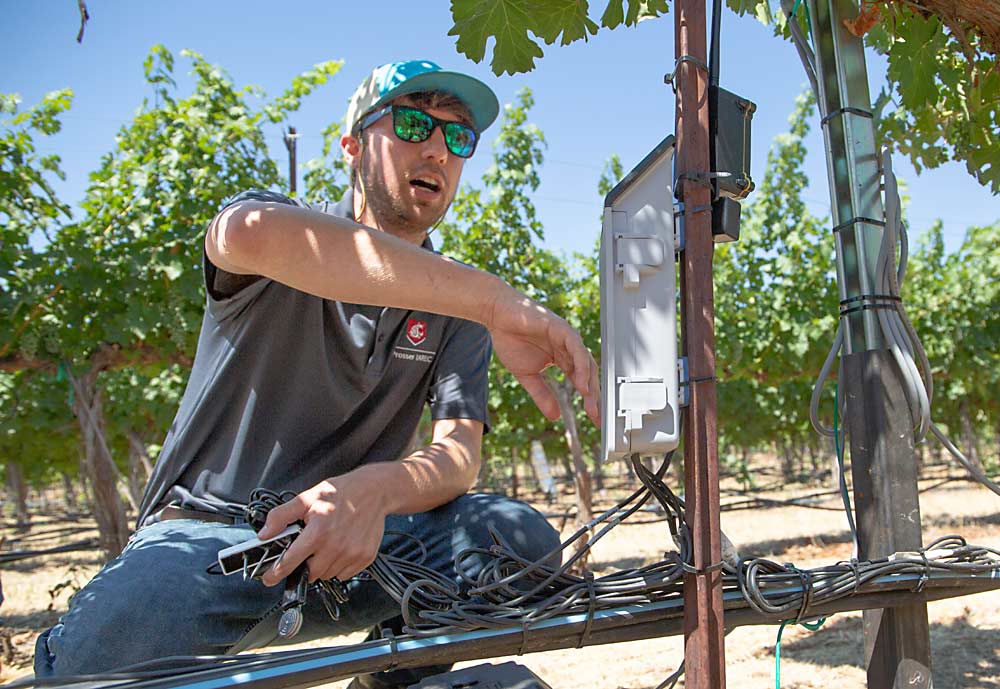—story by Kate Prengaman
—photo by Ross Courtney

To fill a long-awaited precision viticulture researcher role based in Prosser, Washington, the U.S. Department of Agriculture hired an agricultural engineer recently graduated from Washington State University’s Center for Precision Agriculture and Automated Systems.
But what exactly will a precision viticulturist focus on?
That’s the open-ended question facing Jake Schrader, who assumed the new role in August.
“Precision viticulture — it has a large scope to cover,” Schrader said as he settled into a new office just down the hall from where he worked during his doctoral studies. He first aims to learn about the viticultural research projects already underway by his Prosser-based colleagues, including WSU viticulturists Michelle Moyer and Markus Keller and USDA soil scientist Devin Rippner, “to see where I can complement their programs,” he said.
Like Rippner, Schrader will be based at WSU and eventually become adjunct faculty, though they are formally part of the USDA Agricultural Research Service unit based in Corvallis, Oregon.
Incorporating a scientist with an engineering and technology background into those research collaborations will benefit the industry, said Melissa Hansen, director of the Wine and Grape Research Program for the Washington State Wine Commission.
“We all know that ag tech is really in the process of evolving how we farm,” said grower Patrick Rawn of Two Mountain Winery, who also sits on the wine commission’s research committee. “It’s great to get that position filled, and I’m glad they were patient to find the right person.”
Schrader, whose doctoral work focused on alternative pesticide application technologies in orchard systems, spent the past two years working as a technician with the SmartVineyard project. The WSU-hosted demonstration farm is focused on the potential of new sensor technologies and is funded by the AgAID Institute, a consortium of agriculture and technology researchers led by WSU, and the Washington State Wine Commission.
The role introduced him to some of the industry’s precision viticulture needs and the challenges of installing sensor technology on farms.
“My biggest takeaway from the SmartVineyard was tractor blight,” he said.
Now, he’s looking forward to meeting more growers and touring more vineyards to better understand the challenges they face and to set the priorities of his research program.
“I have a lot to learn about the industry’s processes,” he said.
A native of Maine, Schrader first put his mechanical engineering degree to work on ambulance manufacturing, before he decided to enroll at WSU for a Ph.D. focused on agricultural engineering.
The idea of “precision” in manufacturing differs from the application in agriculture, he said, but he’s especially interested in how nondestructive sensing technology can help farmers more efficiently use the tools they have and the tools that will be developed.
Julie Tarara, senior viticulturist for Results Partners, said she is excited for Schrader to bring an engineer’s eyes to the challenges in vineyards today.
“The most important thing to do is hire a strong scientist,” who can get to know the specifics of the industry on the job, she said.
She would know. As a former USDA ARS researcher herself, she started in a horticulturist role in Prosser after earning a Ph.D. in agronomy and she learned the ins and outs of the wine industry on the job.
Tarara was part of the Northwest Center for Small Fruits Research group that advocated for the creation of this new role at ARS back in 2019. Pandemic-related challenges put hiring on the back burner for several years, and the priorities for what the industry needs in the realm of precision viticulture have shifted and grown during that time, she said.
“The Washington wine industry is two industries,” she said. Large growers need mechanization for labor savings, but those tools don’t offer the same benefits to smaller growers without economies of scale.
Precision viticulture needs stretch across both industries. “We need more precise use of our inputs — be that fertilizer, be that pesticides, be that water,” she said.
Hansen agreed.
“Before, the emphasis was really on labor and mechanization. That’s still key… but it’s shifted now to: ‘How can we reduce inputs and improve quality?’” she said. “As this industry has to pivot from large-scale production blocks going to large wineries, it’s even more important now to increase quality without increasing inputs.”
Hansen said the industry priorities around precision viticulture include nondestructive sensors that offer labor-efficient ways to monitor fruit quality and quantity; tools for detection of pests, diseases and poor air quality that could result in smoke-impacted grapes; more efficient use of irrigation and nutrition inputs; and additional work on mechanization of vineyard management.
That’s a wide-ranging wish list for one research program, but Schrader said he’s excited about the opportunity to find the right focus areas, in conjunction with his new colleagues.
Tarara agreed that those relationships will be key.
“I’m really excited for Jake, and I think he’s going to develop strong collaborations,” she said. “We in the industry may not see the application right away, because it does take time, but ultimately we will see the fruits of his research.” •







Leave A Comment